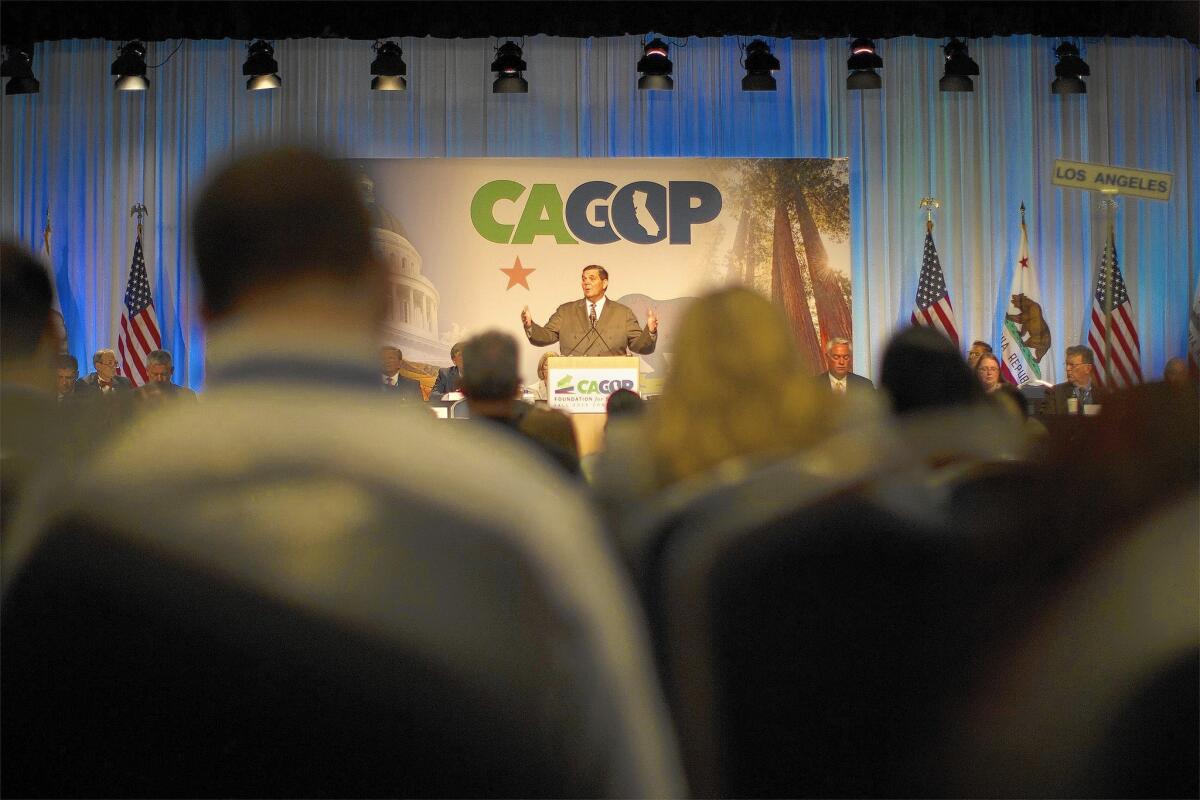California GOP softens its message on immigration in a bid for survival

- Share via
For years, the refrain at state Republican conventions blamed the party’s failures on flawed messengers, not its message. Republicans have now moved closer than ever to acknowledging that the problem has been its message, after all.
In a platform vote Sunday in Anaheim, delegates approved wording that Republicans “hold diverse views” on the fate of millions of immigrants in the country without proper papers, and omitted language that said allowing them to stay “undermines respect for the law.”
It was a small but symbolic step back from their prior hard line against illegal immigration.
It followed by six months the party’s official embrace of the California chapter of the Log Cabin Republicans, recognition the gay group had previously not received.
And it came on a weekend replete with reminders from GOP leaders that Republicans need to shift gears to attract voters not in their camp. The alternative: to lose all possibility of competing in a state where they are already vastly outnumbered by Democrats and their usual allies, independent voters.
“We’ve been out of touch with where voters are,” said Richard Temple, a veteran party strategist who outlined for delegates Saturday the importance to the party’s fortunes of winning back women voters with a positive message. “We have to have the right tone and language.”
SIGN UP for the free Essential Politics newsletter >>
One group, however, seemed not to be listening: the party’s presidential candidates, who unleashed negativity in bulk at last week’s debate in Simi Valley and since then. The single candidate who spoke to the convention delegates, former Arkansas Gov. Mike Huckabee, offered a dire portrayal of the nation “on the brink of collapse” because of a president who exceeded his powers and a Supreme Court guilty of “judicial tyranny.”
Sunday did not mark a wholesale left turn by state Republicans; the same party platform that softened the wording regarding immigration retained the party’s objections to “amnesty.” It also opposed gay marriage and affirmed a strict definition of life as beginning at the moment of conception. Still, the change was noteworthy for what it said about the party’s desire, as Vice Chairman Harmeet Dhillon said Sunday, to “better reflect what our party is now.”
“There’s more sensitivity to the issues around legal and illegal immigration,” she said.
Tension between the old approach, preferred by more conservative elements of the party’s base, and the new one party leaders say is necessary for survival was evident Saturday at a tea party gathering.
Hollywood filmmaker Michael S. Emerson recommended ways to re-brand the party group. He told tea party members to counter any notion that they are extreme by coming up with comforting descriptions of their goals “in a nonthreatening manner.”
But Emerson pointedly referred at least twice to the president as “Barack Hussein Obama.” And when he asserted that tea party members were thought of as “racist, homophobe, xenophobe, gun-toting radicals,” even he seemed surprised when the crowd applauded the description.
“Well, that was a response I didn’t expect,” he said.
Broadening the Republican reach has been a focus of party Chairman Jim Brulte, who has advocated flexibility to allow candidates to conform to the views of their districts — a mantra repeated over the weekend. Typically, that has meant accommodating more moderate views of candidates on matters such as abortion rights, illegal immigration and gay rights.
Although individual Republicans have presented a more moderate face, the party’s official apparatus has trailed behind, trying to bridge its disparate membership.
Some of that difficulty was aired Sunday before hundreds of delegates cast an overwhelming voice vote on behalf of the changes to the immigration platform.
“We are about legal immigration,” one delegate said, forcefully uttering the word “legal.” “I think a platform could say people of the world come to our country legally and reside in our country legally. Period.”
Chief among the groups targeted by Republicans as life preservers are women, Latinos, Asians, independent voters and young voters. The steps taken over the weekend and earlier this year seem directly aimed at those groups.
At a Saturday panel on courting women voters, the audience heard from the party’s two legislative leaders, state Sen. Jean Fuller of Bakersfield and Assemblywoman Kristin Olsen of Modesto. They were visible symbols of a changing party, but statistics outlined after they spoke demonstrated the fight ahead.
Citing studies done before the 2014 election, strategist Temple said the party accounts for 20% of the state’s dependable voters. Democrats represent 45%, more than double the GOP’s share. Independents make up the remaining 35%, but Republicans must capture almost all of them to win statewide elections. That explains why no Republican has won statewide in almost a decade.
Women make up the majority of the state’s voters and are distinct from male voters: By double-digit margins they care more than men about abortion rights, economic inequality, healthcare, the environment and gay marriage, Temple said. (Although Temple did not mention it, women’s views on those subjects generally differ from Republican Party orthodoxy.)
Republican candidates need to come up with ideas on those subjects that are consistent with their principles, he said, and not to just demand that Democratic plans be scuttled.
“If we don’t do something about it, we will not be competitive in California any longer,” he said. “We can get these people, if we have the right message.”
But changing the message comes with the risk of alienating the people who have been the party’s most loyal voters. Jon Fleischman, a former party official and leading conservative voice, blamed the immigration change on the influence of donors such as Charles Munger Jr. Munger, the state party’s most generous benefactor, has worked to elect women and minority members of Congress and the Legislature in an effort to diversify the GOP image.
“You are seeing fewer and fewer grass roots” with influence over such matters, Fleischman said. “Absolutely.”
NEWSLETTER: Get the day’s top headlines from Times Editor Davan Maharaj >>
There is risk as well that Republicans will be seen as not going far enough. The state party did not, for example, back a path to citizenship for people in the country illegally, a position supported by a strong majority of Californians.
And it still bears the fallout from 1994’s Proposition 187, which sought to bar state services from going to people in the country illegally — and has defined California Republicans to their detriment ever since.
“There are going to be people that if we made the chair of the party and the top of the ticket somebody born of immigrant parents, it would not convince them that we are the right party for them because of the history of 187 and other issues,” Dhillon said.
The effect of the recent moves depend on the voter, she said, adding that “we are doing what is right for our party.”
Twitter: @cathleendecker
For more on politics go to www.latimes.com/decker and www.latimes.com/politics.
ALSO
California Republicans confront long odds in race to fill Sen. Barbara Boxer’s seat
GOP victories in California may be small, but they still count
California Republican candidates for U.S. Senate tout unity at party convention
More to Read
Sign up for Essential California
The most important California stories and recommendations in your inbox every morning.
You may occasionally receive promotional content from the Los Angeles Times.














